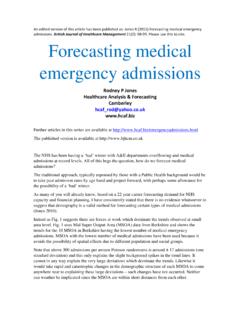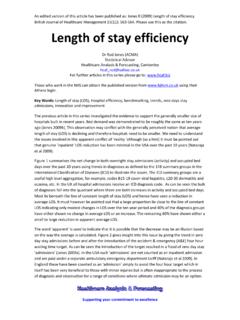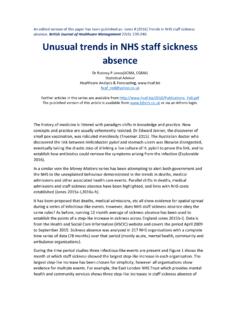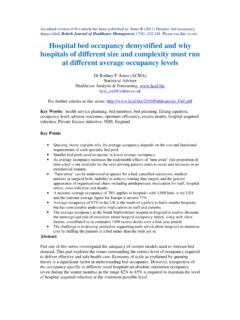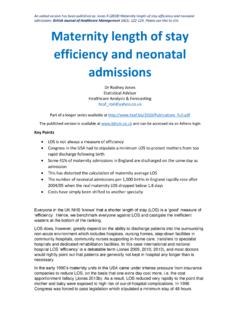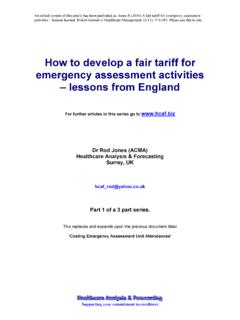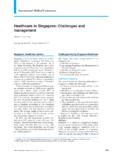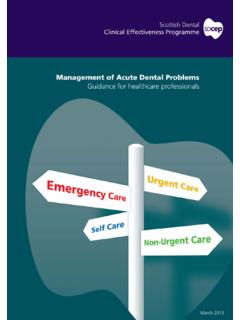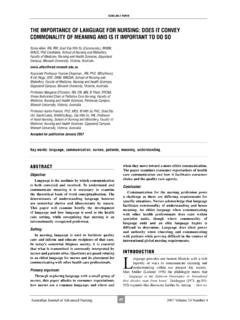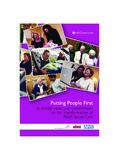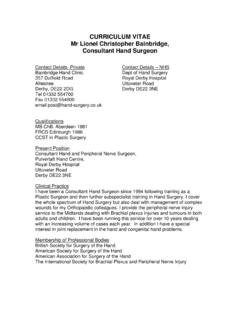Transcription of British Journal of Healthcare Management …
1 An edited version was published as: Jones R (2008) Limitations of the HRG tariff: excess bed days. British Journal of Healthcare Management 14(8): 354-355. Please use this to cite. Healthcare Analysis & Forecasting Supporting your commitment to excellence Limitations of the HRG Tariff: Excess bed days Dr Rodney P Jones (ACMA) Statistical Advisor, Healthcare Analysis & Forecasting, Worcester For further articles in this series go to The published version is available at: and can be accessed via Athens. Key words: Specialty costs, cost per day in hospital, excess bed day, HRG Tariff, England, NHS Every year hospitals submit an analysis of their costs for various HRG. These are called the reference costs and the Department of Health uses these reference costs to devise the national HRG tariff. Local reference costs are first adjusted for the local cost of labor and buildings via the market forces factor and the adjusted costs are then averaged to give the national price for each HRG.
2 Central to the whole exercise is the huge assumption that Trusts are correctly determining the cost for each HRG. One aspect of the tariff is the cost per day for what are called excess bed days . Each HRG has a maximum expected length of stay (the upper trim point) and any stay in hospital beyond this upper trim point is paid on a per day basis using a tariff specific to excess bed days which is different for each HRG. In practice, most Trusts cost an excess bed day at Specialty level, the cost per bed day is the same for every HRG within a specialty. Using the most recent 2006/07 reference costs (DH 2008) we see that: 37% of Trust-Specialty combinations have an identical price for every HRG in the specialty 78% of Trust-Specialty combinations have an almost identical price for every HRG in the specialty, the standard deviation is less than 1% of the average price.
3 This is a reasonable costing approach, but it does lead to the generation of nonsensical tariff values at HRG level since the national average at HRG level is simply the average of specialty costs for however many hospitals count activity for that HRG in different specialties. For this reason, the HRG prices are both inconsistent and erratic. Table 1 gives the national average cost per bed day at a specialty level for elective and emergency admission. As can be seen the Paediatric equivalent always costs more than an adult admission and the relative ranking for the cost of specialties appears to be logical. Emergency and elective prices are comparable with emergency being mostly An edited version was published as: Jones R (2008) Limitations of the HRG tariff: excess bed days. British Journal of Healthcare Management 14(8): 354-355.
4 Please use this to cite. Healthcare Analysis & Forecasting Supporting your commitment to excellence higher than elective except where higher average emergency bed occupancy lowers the average emergency cost per day. Table 1: National average cost per (excess) bed day Specialty Code Specialty Elective Emergency Adult Child Adult Child 100 General Surgery 268 425 243 348 101 Urology 236 391 215 355 102 Transplantation Surgery 335 610 533 110 Orthopaedics 282 614 241 406 120 ENT 268 361 275 368 130 Ophthalmology 359 374 320 370 141 Restorative Dentistry 158 347 101 198 144 Maxillo-facial Surgery 284 1,932 329 273 150 Neurosurgery 197 517 193 365 160 Plastic Surgery 216 527 257 338 161 Burns Care 233 487 172 Cardiac Surgery 278 553 309 615 173 Thoracic Surgery 235 240 174 Cardiothoracic Transplant 486 476 191 Pain Management 255 205 175 301 Gastroenterology 215 514 189 382 302 Endocrinology 202 674 221 564 303 Haematology 244 521 239 503 306 Hepatology 402 311 308 Blood & Marrow Transplant 530 906 316 Clinical Immunology 678 865 992 320 Cardiology 335 489 225 530 323 Spinal Injury 322 387 330 Dermatology 135 790 254 587 340 Respiratory Medicine 341 598 208 647 350 Infectious Diseases 222 282 219 1.
5 773 361 Nephrology 153 417 171 419 370 Medical Oncology 243 510 219 396 400 Neurology 274 603 229 523 410 Rheumatology 217 429 222 308 The national average for the ratio of excess bed days to bed days within the trim point are given in Table 2 at specialty level. Across all specialties there are around 15 excess bed days per 100 bed days within trim for elective admissions and 25 excess bed days per 100 for emergency admissions. This table clearly shows that excess bed days are a function of specialties not HRG s in general. The highest values for these ratios are in Spinal Injuries where there are 144 and 269 excess bed days per 100 bed days within trim for elective and emergency admissions respectively. Paediatric Pain Management has 191 excess bed days per 100 days in trim for elective admission.
6 Note the high proportion of Paediatric specialties which explains the need for the Paediatric uplifts on the standard tariff. An edited version was published as: Jones R (2008) Limitations of the HRG tariff: excess bed days. British Journal of Healthcare Management 14(8): 354-355. Please use this to cite. Healthcare Analysis & Forecasting Supporting your commitment to excellence In conclusion, a specialty view for the cost of an excess bed day gives a more logical view that one based on individual HRG. This is an unavoidable consequence of a specialty-based cost per bed day. Table 2: National ratio of excess bed days per 100 bed days within trim point Specialty Emergency Specialty Elective Spinal Injuries 269 Paediatric Pain Management 191 Medical Ophthalmology 125 Spinal Injuries 144 Paediatric Clinical Immunology 118 Paediatric Infectious Diseases 84 Paediatric Neurology 111 Geriatric Medicine 80 Paediatric Dermatology 108 Midwife Episode 66 Community Paediatrics 100 Dermatology 61 Clinical Immunology & Allergy 88 Paediatric Clinical Immunology 60 Paediatric Gastroenterology 82 Paediatric Metabolic Disease 51 Paediatric Rheumatology 64 Palliative Medicine 49 Paediatric Respiratory Medicine 60 Paediatric Rheumatology 44 Neurology 59 Restorative Dentistry 43 Neonatology 55 Neonatology 43 Paediatric Nephrology 45 Paediatric Respiratory Medicine 41 Dermatology 43 General Medicine 38
7 Palliative Medicine 43 Paediatric Clinical Haematology 37 Paediatric Metabolic Disease 42 Paediatrics 36 Paediatric Urology 41 Rheumatology 35 Geriatric Medicine 39 Paediatric Nephrology 33 All Specialty Average 25 All Specialty Average 15 References Department of Health. Payment by Results 2008/09. Step-by-step guide to the calculation of the 2008/09 national tariff. Department of Health. Payment by Results. Technical working paper: PbR and the market forces factor. Department of Health (2008) NHS reference costs 2006-07
